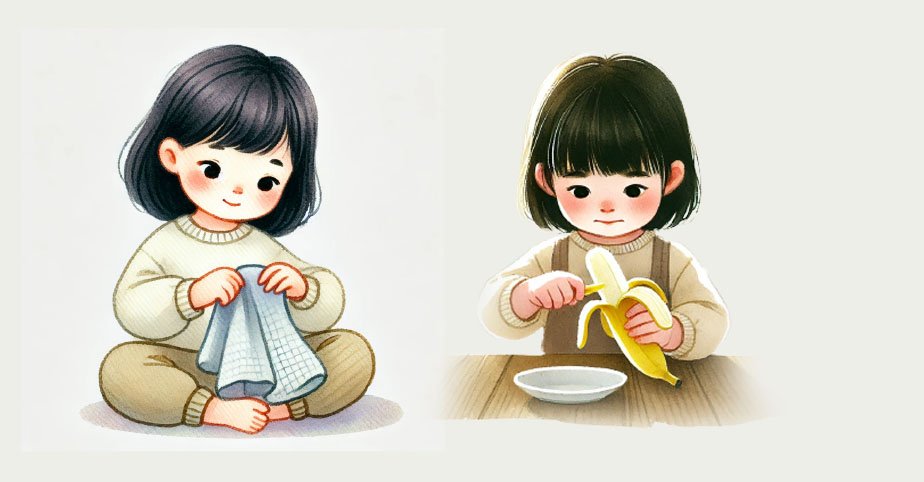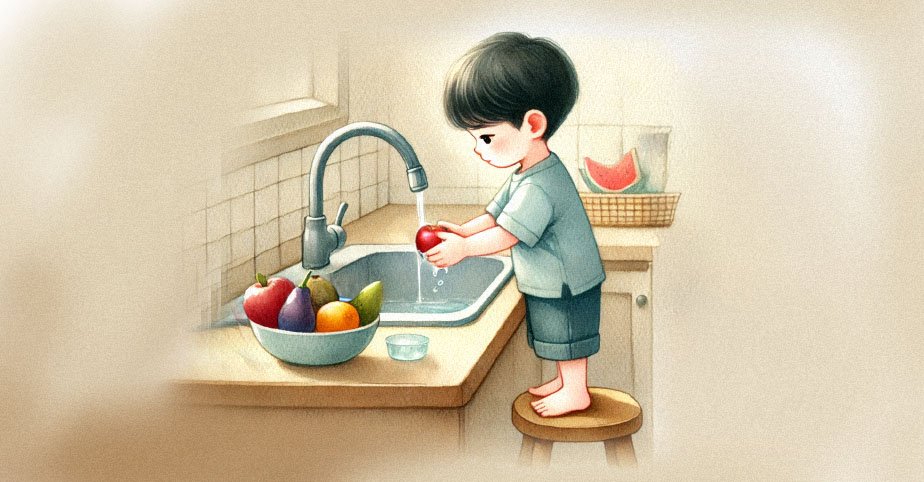As we all know, Children need to acquire new skills at each stage of their development. For children aged 3-4 years, it’s essential to develop basic skills like fine motor skills, hand-eye coordination, problem-solving, spatial awareness, focus, concentration, and independence. As parents, we can do a lot to nurture these skills in our little ones.
Did you know that some of the most effective learning opportunities are happening in your home every day? Simple household tasks can be powerful tools to build critical skills in young children. For kids aged 3-4, daily activities like washing vegetables, folding towels, and setting the table can boost fine motor skills, problem-solving abilities, and more.
Let’s explore how these everyday tasks can shape your child’s development in a meaningful way.
1. Fine motor skills
Fine motor skills involve the use of small muscles in the hands and fingers. It is crucial for activities like writing, buttoning clothes, and drawing. Here’s how common household chores can help:
Washing Vegetables and Fruits: When your child helps wash vegetables, they use their fingers to hold and rub the items, strengthening the muscles in their hands.
Making Balls of Roti: Rolling dough into balls is a good way to strengthen fine motor skills. As your child shapes the dough, they use the small muscles in their hands and fingers
2. Hand-eye coordination
Hand-eye coordination is the ability to match what we see with the movements we make. This skill is important for everyday tasks and physical activities.
Setting the Table: When your child sets the table, they learn to place plates, utensils, and cups in specific spots. This task improves their ability to coordinate their hands with their vision, helping them place items neatly.
Folding Clothes: Matching corners and folding clothes involve carefully watching what they’re doing while guiding their hands to move in the right way.
Peeling a Banana: As your child peels the banana, they learn to coordinate their hands with what they see, improving their control. How about turning snack time into an activity that boosts a critical skill?

3. Problem-solving skills
Problem-solving is a skill we use throughout our lives. By engaging in household tasks, children can practice thinking critically and finding solutions to small challenges.
Matching Socks: Pairing socks from the laundry requires your child to think about patterns, colors, and sizes. It’s a fun way for them to solve problems while organizing their clothes.
Stacking Plates: When setting the table or putting away dishes, your child might need to figure out how to stack plates or bowls in a way that fits neatly in a cupboard or on a table.
4. Focus and concentration
Helping your child develop focus and concentration is important not only for learning but for doing everything in life. Household tasks can provide short, easy activities that require continued attention.
Watering Plants: Asking your child to water plants teaches them to focus on not spilling water and distributing it evenly. It requires patience and care, and even though it’s a small task, it holds their attention.
Stirring in Milk with a Spoon: Stirring sugar into milk helps build focus and concentration. As your child tries to stir carefully without spilling, they practice patience while watching the sugar dissolve.
5. Independence and confidence
Allowing children to participate in household tasks fosters independence. When they contribute to family routines, they feel more confident in their abilities and proud of their contributions.
Eating on Their Own: Encouraging your child to eat independently not only builds motor skills but also increases their self-confidence. They learn they can do things by themselves.
Helping with Laundry: Letting your child help with sorting and folding laundry gives them a sense of responsibility. Over time, they’ll take pride in completing these tasks independently.
6. Spatial awareness
Spatial awareness is the understanding of how objects relate to each other in space. This skill is important for everything from arranging furniture to solving puzzles.
Arranging Plates on the Table: When children set the table, they develop spatial awareness by figuring out how plates, utensils, and cups should be spaced evenly. They learn how items fit together in an organized way.
Arranging Glasses on the Glass Holder: Let your child help arrange glasses on the holder. As they carefully place each glass in the correct spot, they begin to understand spacing, balance, and how to place things with care.
Household tasks offer endless opportunities to help children develop critical skills in a fun, hands-on way. For parents of 3- to 4-year-olds, these activities are not just chores—they are learning experiences. Encouraging your child to participate in everyday tasks builds essential life skills like problem-solving, fine motor coordination, focus, and independence.
So next time you’re folding laundry or preparing dinner, invite your little one to join you. It’s not just about getting the job done—it’s about helping them grow, one small task at a time.
